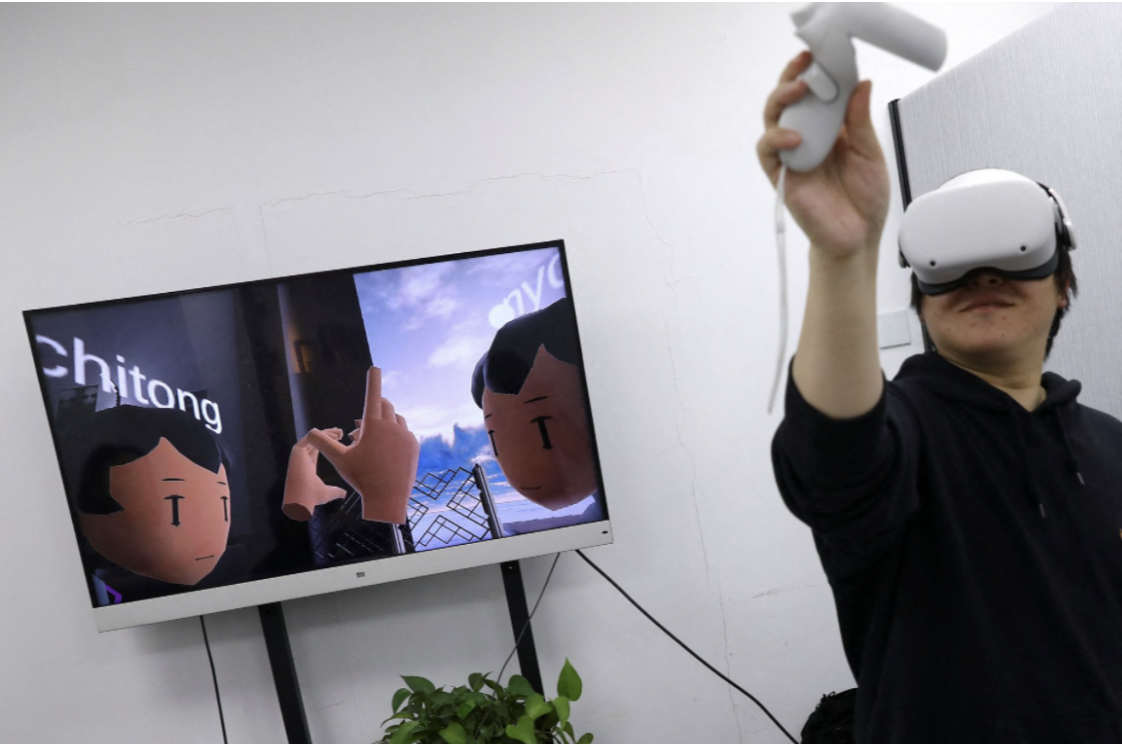China’s Enthusiastic Entry Into the Metaverse Faces CCP Regulations
Pat Bohang, founder of virtual reality gaming platform vHome, looks at virtual content using a Meta Oculus VR headset in a Beijing office. Photo: Tingshu Wang/ Reuters
Meta and Microsoft, two of the world’s largest technology companies, are embracing the Metaverse. Now, China’s leading tech firms are also looking to break into the virtual reality market. However, their creations face government censorship among other interferences.
China banned cryptocurrencies and crypto mining last year. The country also passed the Personal Information Protection Law to address concerns over the amount of data that companies, especially internet sector companies, collect from users. Last fall, Beijing prohibited children under 18 years old from playing online games for more than three hours a week.
More than individual laws will affect companies’ entry into the Metaverse, as any content that makes its way onto China’s internet faces censorship. “It will be much easier for China to oversee development of a local Metaverse rather than allowing users to access the ‘global Metaverse’ and spending significant resources censoring and blocking certain experiences,” Mario Stefanidis, vice president of research at Roundhill Investments, told The Wire.
Analysts say that the market value of China’s Metaverse is worth an estimated $8 trillion, and could include virtual reality, gaming, and social media. “Similar to the pitch we’ve seen from Meta, the Metaverse concept may at first involve VR/AR-supported games and social interactive environments,” said Founder of Tech For Good Asia Charles Mok, to CNBC.
China’s tech companies face the challenge of developing Metaverse platforms that comply with the regulations of the Chinese Communist Party. Photo: The Economic Times/ Rahul Awasthi
Six of China’s top tech companies made the list of top 10 firms to file the most virtual and augmented reality patents, worldwide. Microsoft was the only U.S. firm to make the list, filing 2,108 patents in 2020 and 2021.
These tech giants are looking to expand their already well-established influence. ByteDance owns TikTok, its Chinese equivalent, Douyin, and recently acquired Pico, a virtual reality headset maker. Tencent is the world’s largest gaming company and owner of messaging service WeChat. Internet company Baidu already launched a Metaverse app last year that can hold up to 100,000 people at once, but needs another six years to fully launch, according to a vice president at the company.
While the CCP has several key regulations that disadvantage Metaverse hopefuls, other governments are embracing the investment. Oh Se-hoon, mayor of South Korea, announced the creation of Seoul Vision 2030, a $3.3 million investment to create a virtual city hall, tourist hotspots, and social centers. In the Caribbean, Barbados is looking to establish an embassy in the Metaverse.
“Metaverse is the future of social network. All China’s tech giants have to embrace it to find new ways to engage the youngest generation of internet users,” says Winston Ma, managing partner at CloudTree Ventures.


